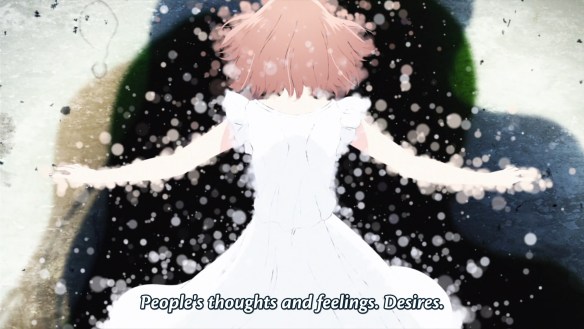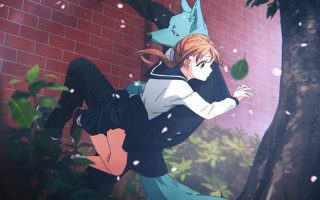Hello folks, and welcome back to Wrong Every Time. Today we’re checking in with what might well be the most gleefully self-destructive cast of characters I’ve critiqued in my animation tenure, a group who could literally trip over happiness and fulfillment and emerge only with scuffed knees and fresh demons. That’s right, it’s time for Scum’s fucking Wish, as our misguided collection of high schoolers and high school-brained teachers bash against each other in some grotesque, self-harming approximation of intimacy.
When last we left off, Scum’s Wish had dedicated a full episode to articulating Akane’s psychology, and her feelings towards both Kanai and Mugi. Brief summary: she sucks, being simultaneously empty and self-absorbed, and combining Hana’s desperate need for affection with a power-hungry cruel streak all her own. Like many of Scum’s Wish’s characters, she is more of an exaggerated articulation of one particular feeling than a coherent psychological profile, a melodramatic irritant who, if you opened up her skull and looked inside for the real story, you would discover is literally defined as “melodramatic irritant.” Akane is less of a person than a slow-moving natural disaster, and at this point I can only hope Hana is strong enough to pull at least one of her delusional suitors out of her orbit. Let’s get to the bloodshed!
Episode 11
“I want more. So shiny and beautiful. People’s thoughts and feelings. Desires. I want to collect all the colors and blur the lines between them.” Akane once again talking like a supervillain as we open our latest episode. Having declared herself an empty person with no genuine feelings, she is eager to pervert the feelings of others and prove they are no different, to “blur the lines” between affection and lust, passion and possession. It’s ultimately all a project of self-justification, the classic “well if I don’t genuinely care about others, everyone else must be lying when they say they do, and I’m going to prove it.”
It feels like the point Mengo Yokoyari is pursuing here is “even adults are still mired in the emotional, identity-forming uncertainty of adolescence,” and given our two alleged adults here are both young twenty-somethings at their first real job, and a job that involves constantly engaging with the mindset of high schoolers at that, I can see that point at least holding some ground here. But I think pursuing that theme itself points to a greater issue with Yokoyari’s writing: her inability to differentiate character voice and internal psychology, such that all of her characters ultimately possess one collective voice and a sort of emotional hivemind
As a result, the point is less “adults are just as emotionally adrift as teenagers” than “adults written like teenagers will act like teenagers.” With her third-wave emo internal ramblings, Akane doesn’t feel like an emotionally stunted adult, but like a teenager in an adult’s body
“Only if we spend the night” is her condition for her next date. As she says, she’s intent on proving no one’s feelings are any more pure than hers, and if she has to put her thumb on the scale in order to make her lovers seem equally “compromised,” she will happily do so
This focus on “purity” also sorta reflects the Yokoyari hivemind problem – whether they reject it, embrace it, or accept it but feel guilty regardless, all of the characters in this show have the same “embracing sexual desire is inherently contemptible” hangup, something that clearly points to an aspect of their upbringing or social conditioning or trauma that would make them feel this way. But this is not a feeling seeded into the characters by their various histories – it is a feeling they have all collectively inherited from Yokoyari, an assumption of the text reflecting the unconsidered assumptions of its author, with no actual in-universe grounding
“I’m having a wholesome date with the minor next week.” These ornate music box frames do a fine job of demonstrating her feelings regarding her suitors, as both possessions and prizes, little boxes on her shelf
We see the younger, internal Akane looking down on these various transgressions. It seems like she thinks that if she can remove herself emotionally from her actions, she can maintain a core that stands apart from her destructive choices
“Is he angry I spent the night? Why does he look so sad? Did I cross a line?” This very focus on transgression demonstrates the immaturity of her feelings. She is rebelling against an expectation that is being imposed by no one; she is both prisoner and jailer, delighting in scandalizing herself. Adolescents rebel because it’s their only way to express agency; Akane possesses total agency, but still wants something to dramatically rebel against
“I feel so disconnected.” This is the ultimate issue, and basically the only true thing she’s said – the practices that seem to provide others with happiness or passion just leave her numb, so she crosses lines to at least feeling something
“Why do you keep doing this if you’re not suited for it?” Kanai seems to embody a potential way forward – someone who is not scandalized by her, but who sees she’s unhappy the way she is, and wishes to help her find a happier self
Her “it’s like we’re having an affair” just sends him into a stammering fit, which only bores her. But what response do you want, Akane? You collect rejection, but your collection doesn’t make you any happier
We touch back down at Banny’s, everyone’s favorite legally distinct diner
Two classmates called Hana here, allegedly for advice, but now they’re grilling her on Mugi
Given her experience, they want advice from her regarding their own relationships. Now this feels very true to life – the blind leading the blind, as those stumbling their way through their first relationship attempt to impart world-weary advice on fellow travelers
“You’re such a grownup, Yasuraoka.” And yet, in their straightforward questions, they’re actually cutting to the heart of a lot of things Hana is awkwardly, immaturely walking around. A classic tragedy of adolescent perspective: believing there is some secret, complex code to mature relationships that only a few special people have figured out, as opposed to the ultimate reality that simple, honest communication is the heart of any lasting bond. It is easier to assume ignorance of some great conspiracy than to admit your feelings bravely and honestly
Leaves falling outside serve a dual purpose, both reminding us of time’s rapid, unceasing passage (lending further urgency to the words of Hana’s companion), and also serving as an easy visual parallel to draw us over to Akane’s date
Kanai says he likes Akane’s sincere, low-affect personality, and suggests she acts more like that at school. He genuinely does seem to like the real her, even though she doesn’t
And so she shares her ice cream, the only gesture of affection she can manage
“The view is so nice!” “I don’t care about the view.” It is pretty funny to follow her perspective. And I do get it, to an extent; she doesn’t find joy in the simple things the way others seem to, she needs stronger shocks to her system to feel alive
She attempts to drag him to bed, and he literally flees the room
Thinking back, she realizes the only time she was able to be physically intimate with him was after forcibly getting him drunk. Just keep digging that hole deeper, Akane
Meanwhile, Kanai’s just trying to enjoy a nice friggin’ vacation at a lovely hot spring resort. Poor guy
And then he steps on his glasses, leaving him half-blind. He’s just off in his own genre over here, conducting a one-man romcom in flagrant disregard of the melodrama everyone else is experiencing
“What did you mean when you told me I didn’t have to stop?” “What are you referring to?” Kanai apparently doesn’t even recall the one conversation that actually gave her some hope regarding their relationship
“I do it because I like it, but I’m asking you how it makes you feel.” A question which he has to stop to consider. So he didn’t actually forget, he was just so unbothered she had to remind him – basically the opposite of her usual system, where it is precisely the agony inflicted by “crossing a line” that she explicitly harvests from her relationships. Kanai’s just like “well, you shouldn’t have to quit your hobby just because we’re going out”
“Why am I nervous?” And as this boy who genuinely doesn’t judge her considers his feelings, she realizes she actually cares about his opinion of her. She’s not just harvesting suffering here – she wants to be liked by him
Thus she’s reduced to actively demanding he hate her behavior, which she can immediately understand as a pathetic, hypocritical need. He’s making her grapple with some contradictions she was perfectly content ignoring
“But I love you.” Without condition
“Even if you love someone, part of your feelings is connected to the notion that this person also loves you.” A key distinction Akane is drawing. Mugi loves the Akane who loves him, and thus he is possessive and demanding. Kanai just loves Akane as she is, with no restrictions or assumptions regarding her feelings attached. The first she understands, as it is in her mind no more than an extension of “self love” – not “I love this person,” but “how great am I, that I was able to make this person love me.” But what can she do with Kanai’s feelings? They simply don’t fit within her framework of how people relate to each other, the comforting rationalization that everyone else is just as utilitarian and self-absorbed as she is
“Why do you love me?” And the key question, loaded with an unspoken “when I can’t even love myself”
“Why can’t you want more?” Her followup question, after he offers a simple “I want the person I love to be happy” that gives her no direction at all. Kanai’s feelings possess no roadmap for Akane to follow
Lovely exchange here – Kanai says he holds back because he doesn’t want to inflict pain on the people he loves, to which Akane responds that a “special kind of pain” can make people grow stronger. Something she’s essentially forced herself to believe, because otherwise, what was the point of all that pain? A universal tragedy – that our suffering served no purpose, that our trauma is simply trauma
And in her mind’s eye, her internal, pure Akane is hugged by Kanai. At last, she is not alone behind the screen
In the morning, Kanai asks her to marry him
“People don’t change that easily. I’m still calculating.” Yep – personal revelations are great and all, but changing your mindset and habits is an extremely gradual process
Nonetheless, she accepts his proposal
Of course, we then jump straight to her date with Mugi. As she says, people don’t change that easily
“Our first date will probably be our last.” Mugi has already resigned himself to Akane’s eventual disinterest. And yet, in the afterglow of Kanai’s proposal, she may be more willing to engage with the world than he’d expect
Mugi recalls a time when Akane was tutoring him, and she said “when I die, I don’t want to be remembered by anyone.”
“The reason she clings to roles is because she actually wants to be freed from her boredom.” Akane desires the same passion others seem to find in life, but can only seek it by trying on a variety of hats, and discovering to her frustration that these roles don’t do for her what they seem to do for others
Akane announces her intent to marry
“People can change. But it’s never because of me.” Mugi falling into exactly the category Akane was describing earlier – someone who loves another because of how their reciprocated love reflects flatteringly on themselves. Thus his immediate response to hearing Akane is getting married is all about himself
Mugi gathers his strength to at least articulate his true feelings one time, to both himself and Akane. He thought he wanted to change her, but he actually loved her selfish, unhappy identity all along
And Done
Holy crap, what was all that!? Genuinely positive emotional developments for like half our cast? Honest conversations that brought characters to greater mutual understanding, and actually allowed them to move forward without bitterness or regret? Who are these people, and what have they done with our Scum’s Wish lunatics?
I jest, but seriously, that was so refreshing! Undoubtedly the show’s best episode yet in terms of sympathetic, believable emotional drama, and also its most genuinely insightful regarding character psychology. As it turns out, “No Peace, Problems Always” Akane was really just a half-step away from contentment all along, ultimately just needing someone who loved her in spite of her allegedly contemptible nature, who in turn would allow her to forgive herself and seek earnest love as well. This steady dismantling of Akane’s various psychological shields did a remarkable job of humanizing what had been one of Scum’s Wish weakest (though undoubtedly most entertaining) links, and gives me great hope leading towards our grand finale. Could these characters actually stop destroying themselves? I guess we’ll find out!
This article was made possible by reader support. Thank you all for all that you do.




